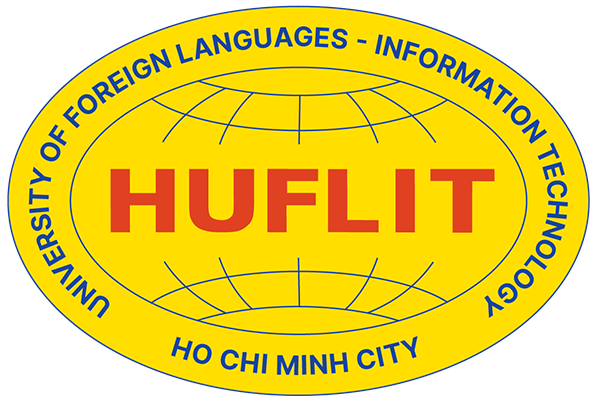-
HUFLIT Career Talks #23: "Giải Mã" Cơ Hội Nghề Nghiệp Tiếp Viên Hàng Không & Trải Nghiệm Thực TếNgày 26/6/2025 vừa qua, HUFLITers đã có một “chuyến bay” định hướng sự nghiệp đầy hứng khởi tại sự kiện HUFLIT Career Talks #23. Với chủ đề “Cơ hội nghề nghiệp Tiếp viên Hàng không cùng EVA Air”, buổi talkshow đã mang đến cái nhìn toàn cảnh về ngành hàng không, đặc biệt là tiềm năng phát triển và cơ hội gia nhập đội ngũ tiếp viên hàng không chuyên nghiệp của hãng hàng không tư nhân lớn nhất Đài Loan.
-
Học tại HUFLIT - Cơ hội trải nghiệm quốc tế và gặp gỡ các quan chức ngoại giao cấp caoTháng 6 năm 2025, HUFLIT vinh dự đón tiếp các vị Tổng Lãnh sự tại TP.HCM đến từ Hàn Quốc, Nga, Trung Quốc và Hoa Kỳ trong những chuyến thăm và giao lưu ý nghĩa. Đây không chỉ là những sự kiện ngoại giao quan trọng mà còn là dịp để sinh viên HUFLIT thể hiện bản lĩnh, tư duy toàn cầu và khát vọng hội nhập quốc tế.
-
HUFLIT mở cổng sơ tuyển kết quả thi đánh giá năng lực 2025 của Đại học Quốc gia TP.HCMTừ hôm nay đến hết 15/7/2025, HUFLIT nhận hồ sơ ứng tuyển kết quả thi đánh giá năng lực 2025 của Đại học Quốc gia TP.HCM (ĐGNL của ĐHQG TP.HCM) từ 500 điểm.
Faculty of Oriental Languages and Cultures – Introduction
The majors of Oriental Studies, Korean Studies, and Japanese Studies at HUFLIT offer specialized training in Korean and Japanese studies, and these two fields are increasingly chosen by many young students with the desire to seek job opportunities in the international job market.
I. Oriental Studies – Korean Studies Major
Korean Studies is an attractive major, favored and chosen by many students because of the wide range of job opportunities it offers.
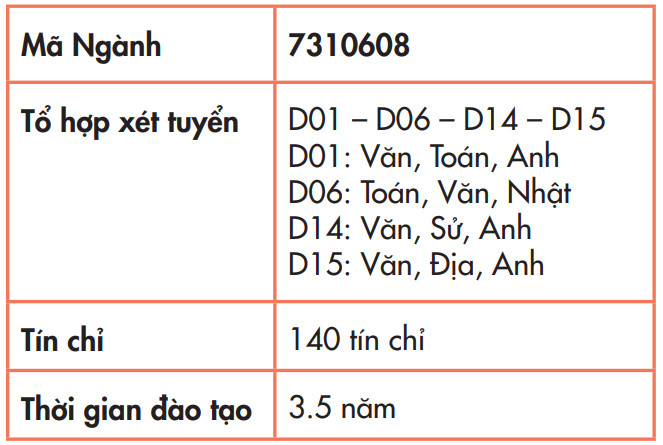
The distinctive features in training program:
- The Korean Studies major trains graduates with fundamental and in-depth knowledge about the region and country of South Korea. Students have the opportunity to participate in study tours, internships, and exchange programs with universities in South Korea.
- The training program of the Korean Studies major is divided into two groups of courses: Administrative – Office and Culture – Tourism. In addition to learning Korean language skills such as listening, speaking, reading, and writing, students in this major are also trained in specialized professional skills.
- The major regularly organizes various academic activities for students to participate in, such as Korean language speaking competitions, Korean language clubs, visits to and internships at domestic and foreign companies, participation in cultural festivals, and scientific research.
 Lecturer introducing about the provinces of South Korea
Lecturer introducing about the provinces of South Korea
Career opportunities:
- Teaching or conducting research in specialized fields of Korean Studies at agencies or schools.
- Working in cultural, educational, tourism, diplomatic, translation, representative agencies, trade offices, economic organizations, and press agencies.
- Engaging in translation, event organization, and tourism both domestically and internationally.
- Continuing their studies to advance their qualifications in postgraduate programs related to domestic specializations such as Linguistics, Asian Studies, Cultural Studies, World History, East Asian Studies, etc.
- Opportunities to work in multinational companies, foreign affairs agencies, diplomatic offices, international organizations, media companies, Korean language teachers, etc.
II. Oriental Studies – Japanese Studies Major
The Japanese Studies major provides students with a solid foundation of knowledge about Japanese culture, history, economy, politics, and people in Japan.

The distinctive features in training program:
- The Japanese Studies major trains graduates who have a rich understanding and diverse knowledge of various aspects of Japanese culture, language, history, economy, society, politics, etc.
- Students have the opportunity to practice communication skills with native-speaking instructors, study an additional foreign language (the second language), and acquire cultural business skills.
- A solid foundation in the Japanese language and specialized knowledge provides students with numerous job opportunities.
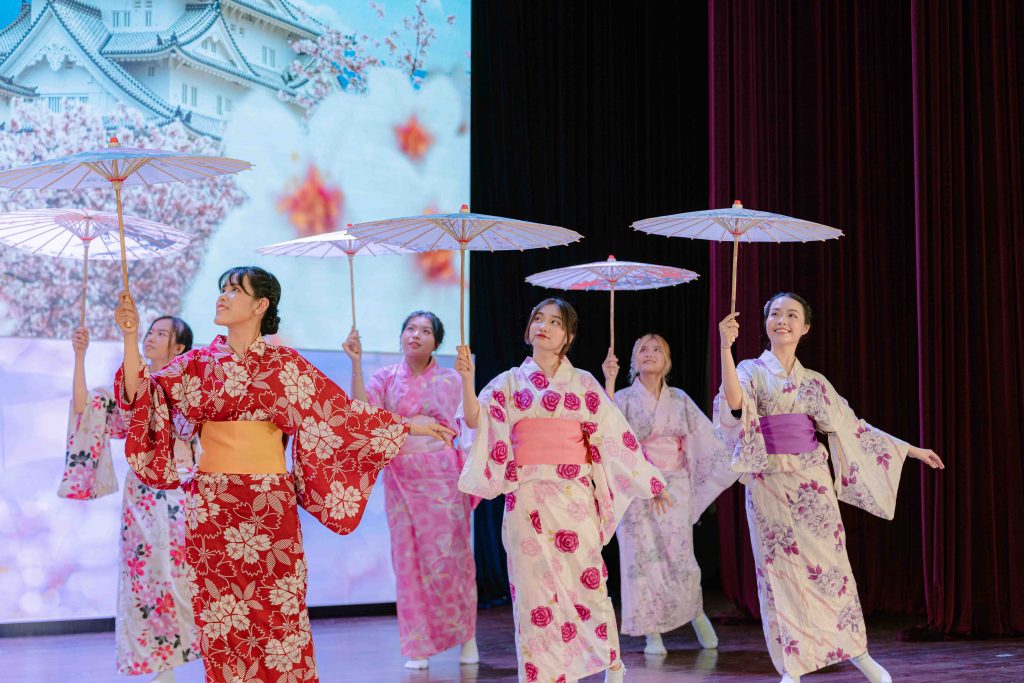 Traditional Japanese cultural performance in traditional costumes presented by HUFLIT students
Traditional Japanese cultural performance in traditional costumes presented by HUFLIT students
Career opportunities:
- Graduates of the Japanese Studies major can take on various roles, ranging from specialists to managerial positions, in fields such as cultural institutions, education, tourism, diplomacy, translation, representative offices, trade offices, economic organizations, and media agencies.
- They can also engage in teaching or conducting research related to Japanese Studies and other East Asian countries at various institutions and schools.
- Moreover, they have opportunities to participate in translation work, event organization, and work as tour guides.
- Continuing education at the postgraduate level is also possible, pursuing fields such as Linguistics, Asian Studies, Cultural Studies, World History, East Asian Studies, or other diverse disciplines, both domestically and internationally. Additionally, they can pursue higher studies or become research fellows at foreign universities in various fields.
III. Korean Language Major (Planned):
In the Korean Language major, students will gain in-depth knowledge of the Korean language, including speaking, pronunciation, essential vocabulary, and grammatical structures. This enables students to develop their skills in listening, speaking, reading, and writing in Korean for effective communication and work purposes. Moreover, the major also provides additional insights into Korean people, culture, and society, offering a comprehensive understanding of Korea.
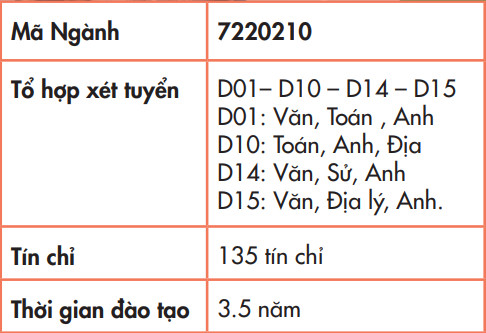
The distinctive features in training program:
-
Students learn Korean from basic to advanced levels, focusing on listening, speaking, reading, and writing skills, with opportunities to practice communication and study with Korean native-speaking instructors.
- The language proficiency standard achieved is equivalent to the TOPIK (Test of Proficiency in Korean) or KLAT (Korean Language Ability Test) level 4 or higher.
- Students have the chance to receive various scholarships such as the KF-Sam and Lotte scholarships or participate in exchange programs to study in Korea.
- Access to advanced learning methods with classes incorporating smart devices.
-
Engaging academic and extracurricular activities, diverse clubs. Students can participate in Korean language speaking competitions, visit and intern at Korean companies, experience Korean cultural festivals, explore traditional Korean arts, and conduct scientific research.
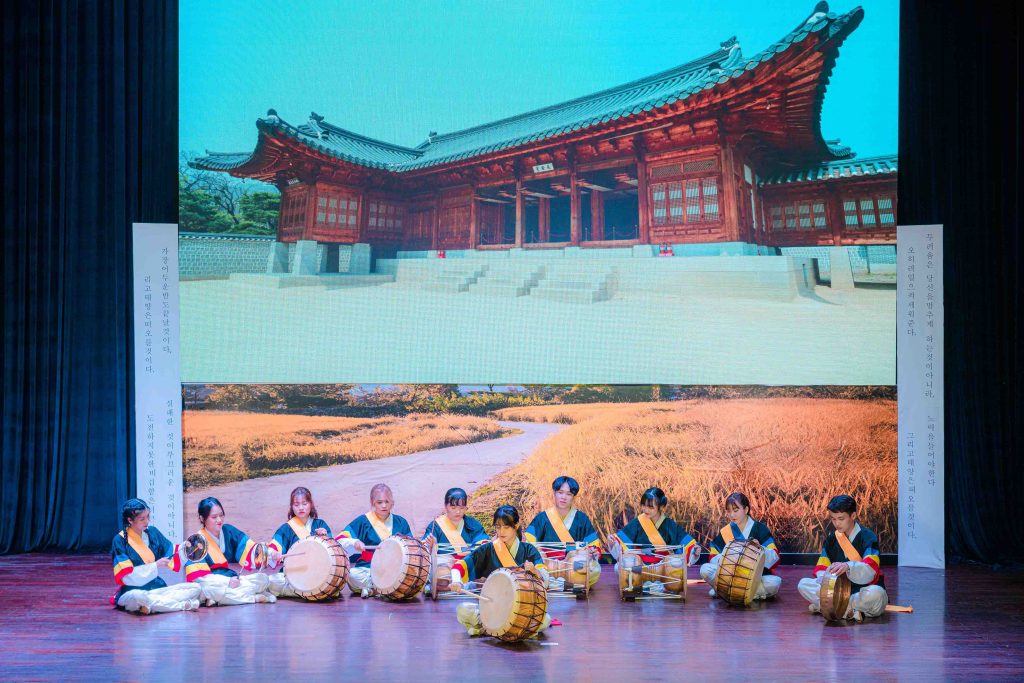 HUFLIT students playing musical instruments in traditional Korean costumes
HUFLIT students playing musical instruments in traditional Korean costumes
Career opportunities:
- Translation for organizations, businesses, joint ventures.
- Translation of books, newspapers, and images for publishers, book distributors, and comic book companies; or translating documents for companies in need of Korean language texts.
- Marketing Specialist: Conducting research on economics, politics, lifestyles, and commerce in Korea.
- Assistant, Secretary: Participating in negotiations, signing collaborations, negotiating and resolving issues, and presiding over conferences for Korean leaders.
- Tour guide at tourist destinations with foreign visitors or working in travel companies to welcome Korean tourists and organize tours to Korea.
- Teaching at universities, colleges, vocational schools, and foreign language centers to teach Korean language learners; or offering additional classes for students studying Korean language.
- Pursuing further education to enhance qualifications and skills.
IV. Japanese Language Major (Planned):
The Japanese Language major not only focuses on in-depth training in the Japanese language but also provides fundamental knowledge about the region, country, and people of Japan. Additionally, it emphasizes the development of specialized skills to serve future careers.
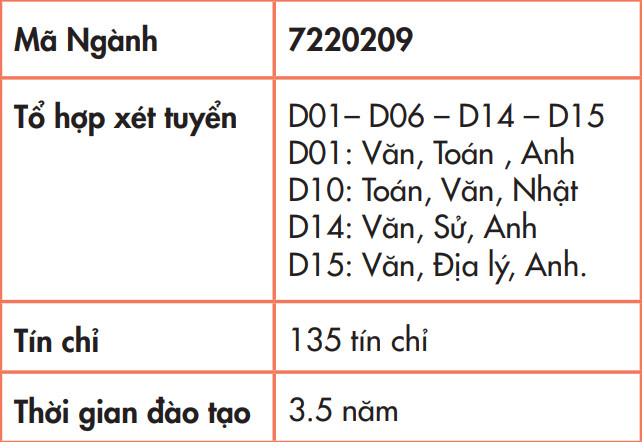
The distinctive features in training program:
- The training program in Japanese Language Studies offers comprehensive instruction from basic to advanced levels, covering listening, speaking, reading, writing, and practical communication skills.
- The language proficiency standard aligns with the Japanese Language Proficiency Test (JLPT) N2 or J-Test level C and above.
- Students have the opportunity to study with native Japanese teachers
- Students can participate in study abroad and exchange programs at various Japanese universities, such as Teikyo University, Bukyo University, Ibaraki Christian University, Kobe International University, Fukui University, Ryukoku University, Toua University, and Kyushu Sangyo University.
- The program also provides diverse academic activities and cultural experiences.
 Hiragana alphabet is one of the first sets of characters that HUFLIT students learn when getting acquainted with the Japanese language from year 01
Hiragana alphabet is one of the first sets of characters that HUFLIT students learn when getting acquainted with the Japanese language from year 01
Career opportunities:
- Japanese Interpreter and Translator.
- Marketing Specialist and Event Organizer for business and trade activities.
- Specialist in facilitating transactions with Japanese partners.
- Employment as staff in Japanese companies, tourism, restaurants, and hotels.
- Teaching positions in the field of Japanese language studies.
For more information:
>> Tree diagram
>> Outline
CONTACT INFO
Advising education enrollment

